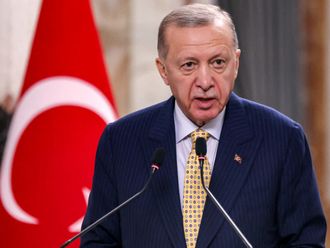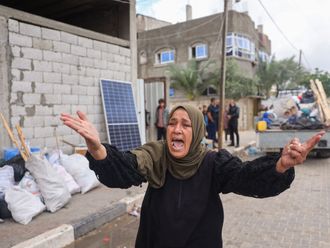Tehran: Two assailants on a motorcycle attached magnetic bombs to the car of an Iranian university professor working at a key nuclear facility, killing him and another person yesterday, state TV reported. The slayings suggest a widening covert effort to set back Iran's atomic programme.
Yesterday's killing of Mustafa Ahmadi Roshan was the fourth attack to kill a leading scientist in the country in almost two years.
The attack in Tehran bore a strong resemblance to earlier killings of scientists working on the Iranian nuclear programme. It is certain to amplify authorities' claims of clandestine operations by western powers and their allies to halt Iran's nuclear advances.
The bomb killed Mustafa Ahmadi Roshan, a chemistry expert and a director of the Natanz uranium enrichment facility in central Iran, state TV reported. Natanz is Iran's main enrichment site, but officials claimed earlier this week that they are expanding some operations to an underground site south of Tehran with more advanced equipment.
The US and its allies are pressuring Iran to halt uranium enrichment, a key element of the nuclear programme that the West suspects is aimed at producing atomic weapons. Uranium enriched to low levels can be used as nuclear fuel but at higher levels, it can be used as material for a nuclear warhead.
Underground ‘terrorism'
Iran denies it is trying to make nuclear weapons, saying its programme is for peaceful purposes only and is geared towards generating electricity and producing medical radioisotopes to treat cancer patients.
Iran has claimed that Israel's Mossad, the CIA and Britain's spy agency are engaged in an underground "terrorism" campaign against nuclear-related targets, including at least three slayings since early 2010 and the release of a malicious computer virus known at Stuxnet in 2010 that Iran says disrupted controls of some centrifuges — a key component in nuclear fuel production. Both countries have denied the Iranian accusations.
Israeli officials have hinted about covert campaigns against Iran without directly admitting involvement.
‘Critical year'
On Tuesday, Israeli military chief Lieutenant General Benny Gantz was quoted as telling a parliamentary panel that 2012 would be a "critical year" for Iran — in part because of "things that happen to it unnaturally".
"Many bad things have been happening to Iran in the recent period," added Mickey Segal, a former director of the Israeli military's Iranian intelligence department. "Iran is in a situation where pressure on it is mounting, and the latest assassination joins the pressure that the Iranian regime is facing."











